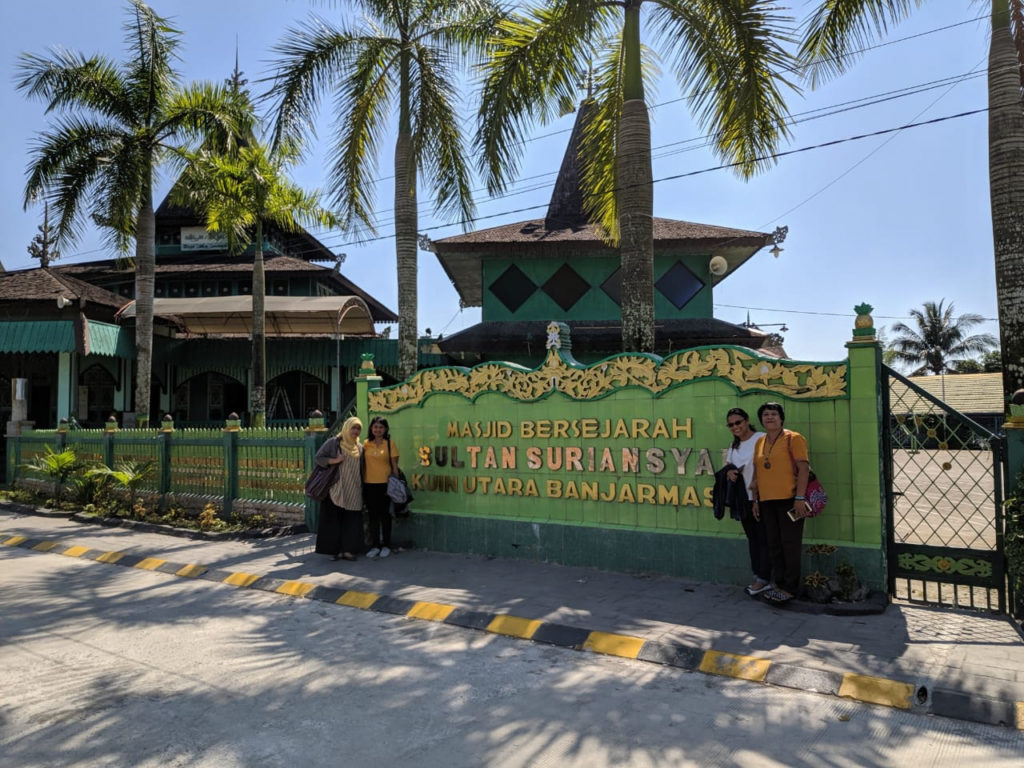Women’s Interfaith Gathering in Kalimantan, Indonesia
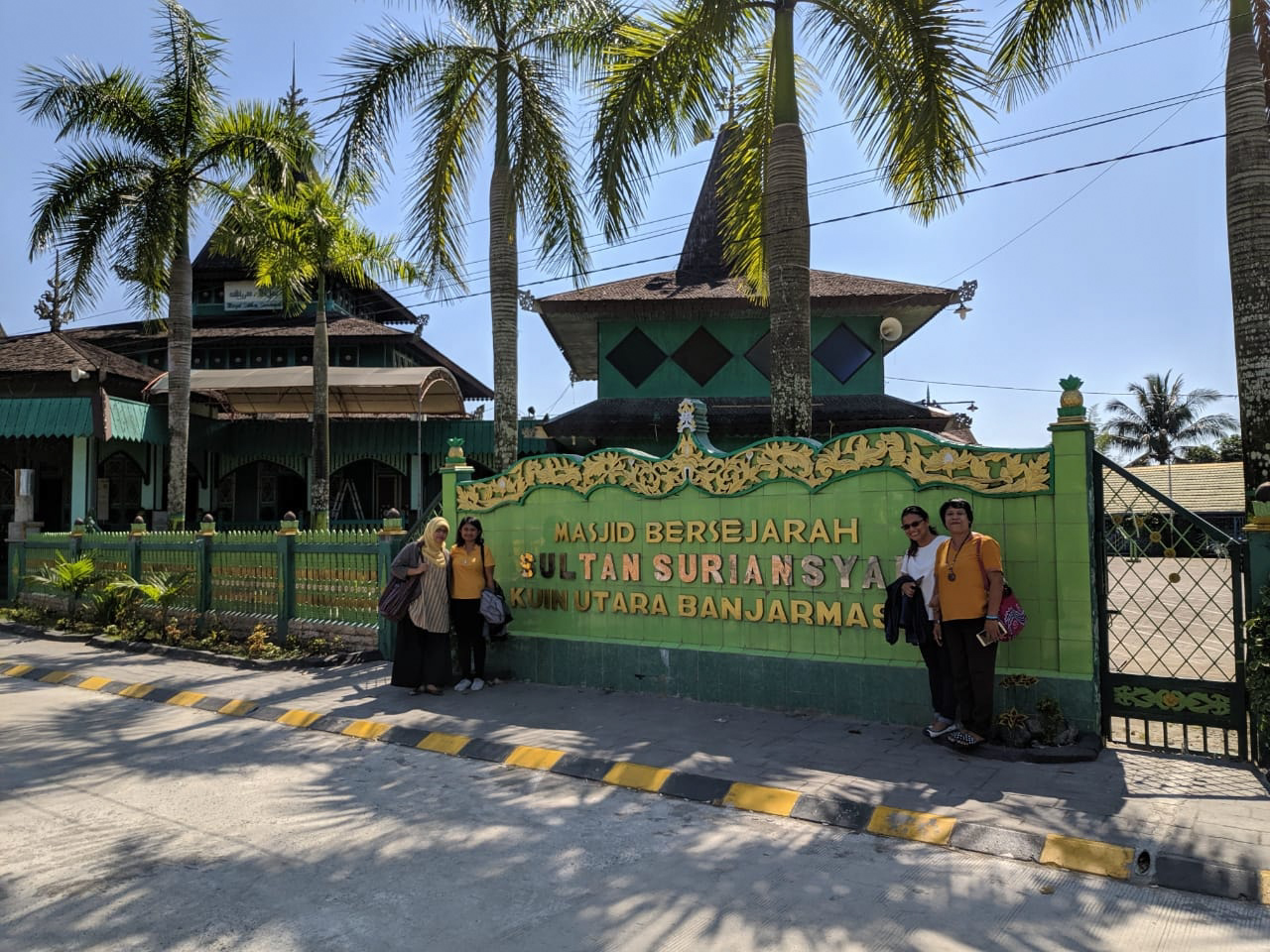 Praise the Lord for our recent Women’s Interfaith Gathering! We are truly grateful for the travel assistance from Global Ministries and the recommendation from Rev. Mery Kolimon. Without the funds and the recommendation, Rev. Herlina Ratu Kenya, Rev. Lastri Agustaf and Meliani E. M. Yeni Kurniawati will not be able to attend. The program went from 9:00 am until 6:00 pm and was followed by a group dinner. Usually, informal conversations went until 9:00 pm. The event was attended by 30 women from different religious backgrounds.
Praise the Lord for our recent Women’s Interfaith Gathering! We are truly grateful for the travel assistance from Global Ministries and the recommendation from Rev. Mery Kolimon. Without the funds and the recommendation, Rev. Herlina Ratu Kenya, Rev. Lastri Agustaf and Meliani E. M. Yeni Kurniawati will not be able to attend. The program went from 9:00 am until 6:00 pm and was followed by a group dinner. Usually, informal conversations went until 9:00 pm. The event was attended by 30 women from different religious backgrounds.
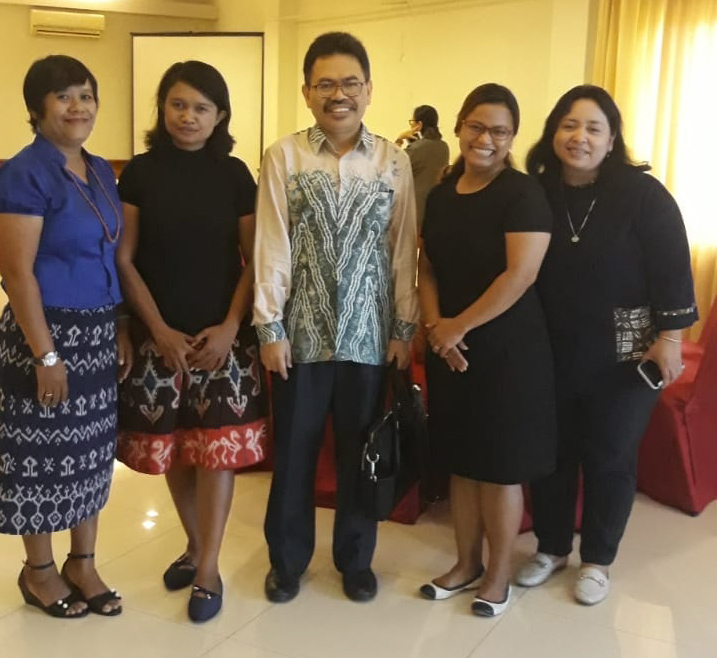
The first day, there were four sessions. The first session was about the development of fundamentalism, radicalism, and terrorism in Indonesia by Prof. Dr. H. Mujiburrahman as the President of the Islamic State University of Banjarmasin. The second and third sessions were given by Prof. Olaf Schumman who talked about the root and development of fundamentalism and radicalism in religions and building justice and peace from the point of view of religions.
The last session of the first day was given by the Director of the Institute for Islamic and Social Studies in Banjarmasin, Mrs. Rafikah, who talked about creating interfaith dialogue from a Muslim perspective. Some highlights of the sessions from the first day include:
-
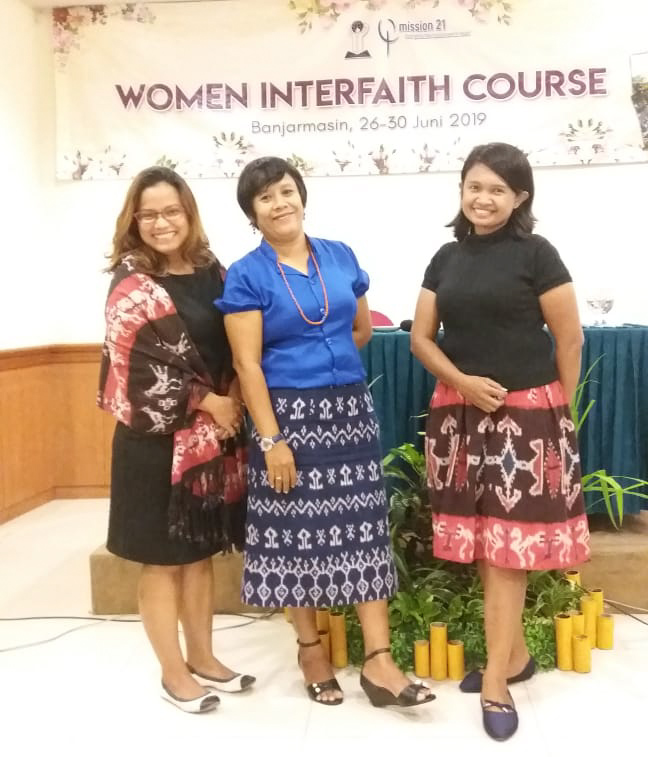 We learned that the term fundamentalism in Islam is being used incorrectly. Fundamentalism was coming from Western Christianity who tried to find similarity in the Muslim groups. The right term for it should be Ushuliyyah which means to go back to the original text e.g. Qur’an and Sunnah. However, Islam in Indonesia is still using the word ‘fundamentalism’ for this instead.
We learned that the term fundamentalism in Islam is being used incorrectly. Fundamentalism was coming from Western Christianity who tried to find similarity in the Muslim groups. The right term for it should be Ushuliyyah which means to go back to the original text e.g. Qur’an and Sunnah. However, Islam in Indonesia is still using the word ‘fundamentalism’ for this instead. - The entrance door to create reconciliation between religions is admitting or acknowledging that we are the perpetrator and victim at the same time. We have to admit that we have made mistakes such as humiliating the other religions because we are saved; we have the light of God, thus the others have to be saved.
- The Qur’an says that God sets us in nation and tribe so that we may know each other. The Prophet Muhammad was in dialogue with a priest whom he thought of as a spiritual consultant.
The second day, there were four sessions as the following:
- “Creating Interfaith Dialogue from Christian Perspective” presentation was given by Dr. Darius Dubut who is a senior lecturer at Christian State School in Palangkaraya;
- “Interfaith women in action to create gender equality, justice, and peace for all – from the feminist Muslim perspective” presentation was given by Ms. Mariatul from the Institute for Islamic and Social Studies in Banjarmasin
- “Interfaith women in action to create gender equality, justice, and peace for all – from the feminist Christian perspective” presentation was given by Dr. Elizabeth Marantika from NGO Gafira in Ambon.
- “Sharing session – Interfaith works on the ground – learn from Borneo and Sumba.” This was a panel session. The panelists were Rev. Evi Nurleni from Center Borneo; Dr. May Linda Sari from Evangelist Christian Church Theological Seminary; and Rev. Herlina Ratu Kenya from Sumba.
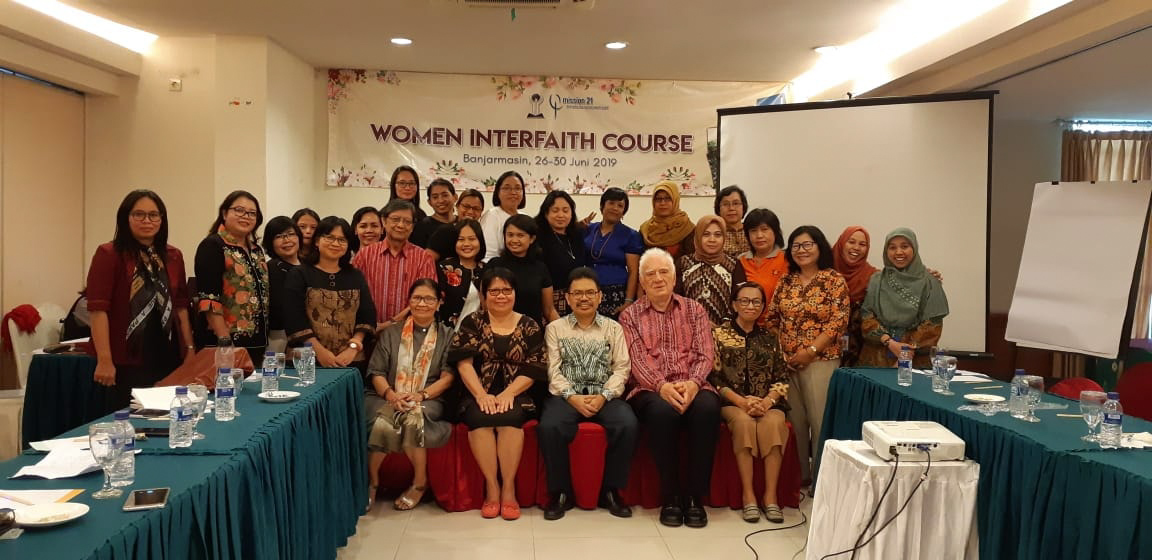 On the second day, we all learned how to maintain good relationships among diverse religious groups. In Banjarmasin, where the event was located, Muslims make up 97% of the population.
On the second day, we all learned how to maintain good relationships among diverse religious groups. In Banjarmasin, where the event was located, Muslims make up 97% of the population.
Within the Muslim group itself, there are various groups which make the INTRA-Faith more challenging than Interfaith relations. We also learned that there are three types of illness, one may say, in religious groups. The first is intellectual arrogance which creates absolutism; second is social arrogance which creates exclusivism; last is emotional arrogance which creates fanaticism. Many Christian participants felt that sadly the last illness is more popular nowadays in the Christian group.
On the third day, we started with a fun activity which was visiting the floating market. After that, we regrouped around 11:00 am in order to discuss our action plan. In Sumba, our first priority is to find diverse religious groups and engage with them more intensively. The gathering was closed with an interfaith prayer and the centerpiece was created by Rev. Herlina Ratu Kenya. The centerpiece was the highlight of the day as well since everyone loved taking a picture with it.
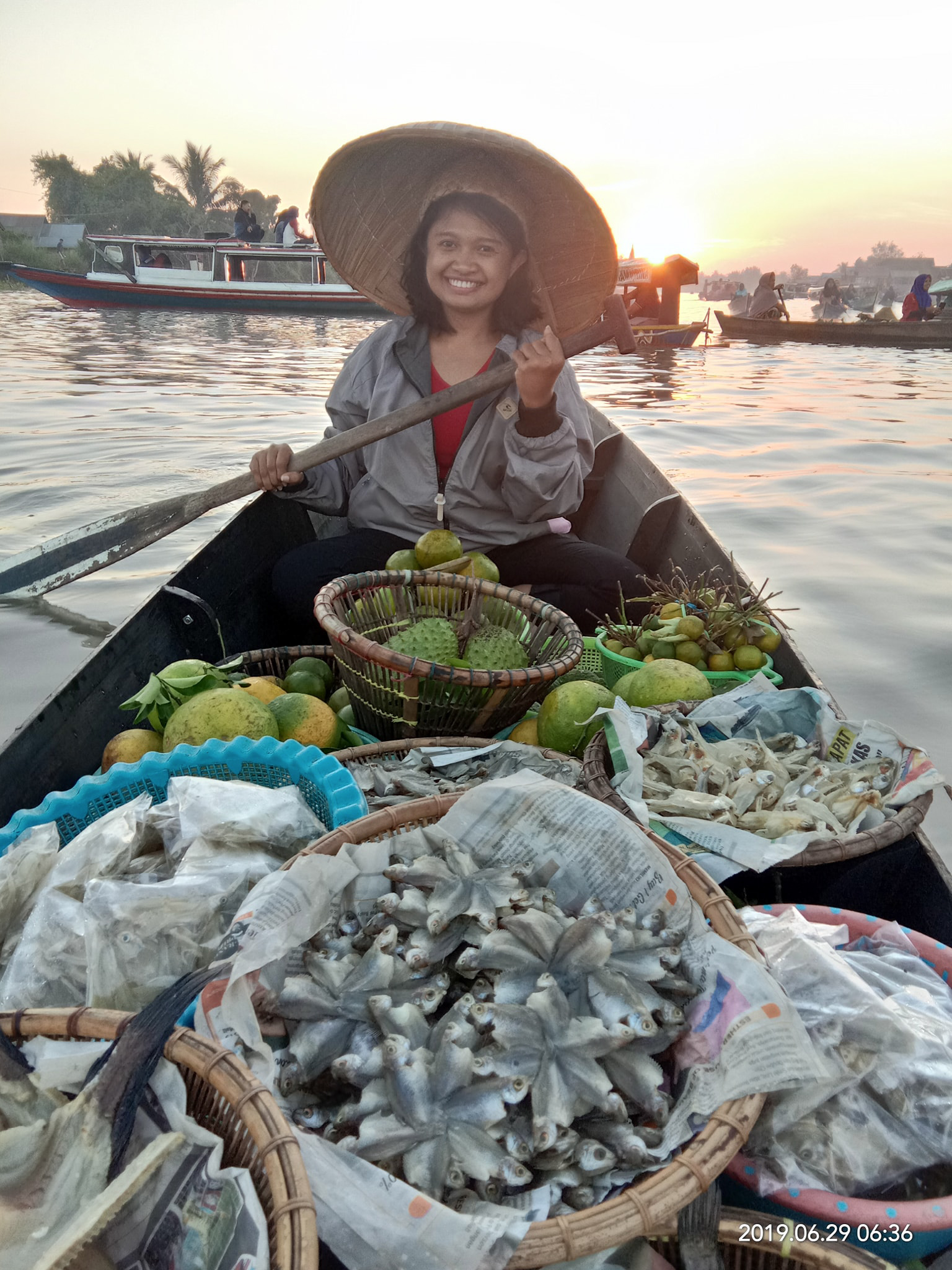 On our last day in Banjarmasin, we visited several mosques and tombs of the Sultans, which are sacred places for Muslim in Banjarmasin, before we headed to Jakarta. We had to fly to Jakarta in order to get a better price of flight tickets. Since we had to stay a couple of days in Jakarta, we wanted to make the best of it. We visited the office of the National Commission on Violence Against Women. We met with the chairperson, Ms. Azriana Rambe Manalu, and discussed the issues of violence against women in Sumba and the industrial impact that happened in East Sumba. We also discuss the stratification in East Sumba tradition. We got many books from them to share with our friends here. We also visited Jakarta Theological Seminary and met with Dr. Joas Adiprasetya. Rev. Herlina hopes to get her Ph.D. under his supervision.
On our last day in Banjarmasin, we visited several mosques and tombs of the Sultans, which are sacred places for Muslim in Banjarmasin, before we headed to Jakarta. We had to fly to Jakarta in order to get a better price of flight tickets. Since we had to stay a couple of days in Jakarta, we wanted to make the best of it. We visited the office of the National Commission on Violence Against Women. We met with the chairperson, Ms. Azriana Rambe Manalu, and discussed the issues of violence against women in Sumba and the industrial impact that happened in East Sumba. We also discuss the stratification in East Sumba tradition. We got many books from them to share with our friends here. We also visited Jakarta Theological Seminary and met with Dr. Joas Adiprasetya. Rev. Herlina hopes to get her Ph.D. under his supervision.
Once again, we are thankful for the opportunity you have given us. This trip has been a tremendous and extremely enriching experience for the three of us. Below is the testimony from Rev. Lastri Agustaf who is learning English:
“I want to thank God for giving me a chance to involve “Women Interfaith Course in Banjarmasin” and to Global Ministries for your travel fund for giving me and two others a chance to attend this event. Personally, it was the first event that I attended since I became a Reverend in the Christian Church of Sumba.
Days following this event, there were many things I got, such as knowledge and experience in interfaith relationship. During this course, I met many women across faiths, who struggled to create a space for interfaith dialogue and made interfaith community amid the practice of intolerance that occurred in Indonesia.
On other side, I also met, many great speakers who spoke about fundamentalism, intolerance, and terrorism and I learned why it happens and how we create a new way to make a better life in a pluralist country of Indonesia.
At the end of the course, I have a chance to visit the Oldest Mosque in Banjarmasin, Suriansyah Mosque, that was built by Sultan Suriansyah in 1526.
I am so blessed to attend every wonderful session that inspired me and all the members to create an interfaith community as a bridge to interfaith dialogue to discuss many issues about terrorism, radicalism and to know more about the other religion.”

